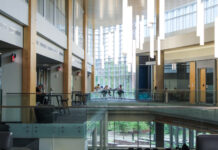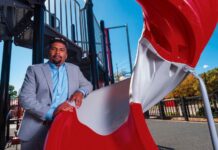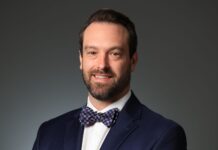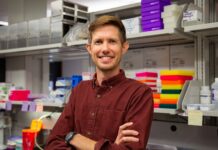
Dr. Neville Pinto met with members of the media Thursday to provide some insight on his priorities as he serves as acting president of the University of Louisville.
Pinto transitioned to the role last week after the Board of Trustees accepted former President James Ramsey’s resignation. He was vacationing with his family in Hilton Head at the time.
“I was sitting on the couch with my son watching a movie. I was actually almost asleep. I don’t think he knew that,” Pinto said. “I got the call and was informed that I was now acting president of the university … I have to be honest, it’s been a whirlwind for me this past week.”
Pinto has been at UofL just shy of five years, first arriving on campus in September 2011 to serve as dean of the J.B. Speed School of Engineering and professor of chemical engineering. He was appointed interim provost in July 2015. The job included oversight of the university’s academic programming and day-to-day operations.
Though he admitted to being surprised by the abrupt transition, Pinto said he is honored that the Board of Trustees asked him to lead the institution in this interim period.
“What I recognized very quickly was that there is a flood of support for us to move forward. I’ve heard from many faculty, staff, student, alumni and community members, expressing their support for the university and for me to move it forward,” he said. “That has really encouraged me, and I’ve started gaining confidence that we can do it.”
As provost, Pinto was charged with the implementation of the university’s 21st Century plan and said that the plan will continue to be the structure he and his leadership team will use.
“It’s an exciting plan. It connects to what’s most important for us here and that is a first-rate education for the students. It’s about student success, quality of programs, putting out outstanding research,” he said. “It connects to our service to the community, service in a way that is unique for a university – our ability to bring our intellectual potential to provide long-range solutions for our community.”
Pinto credited a strong team, including vice presidents and deans, for helping to bring these objectives to fruition. He also credited faculty and staff for making sure the university didn’t miss a beat during the transition.
“The task right now is to get ready for almost 3,000 students coming in as our freshmen class and the 22,000-some students that will be coming back to campus for the fall semester,” Pinto said. “I’m excited. I feel optimistic. I feel energized.”
Pinto fielded some questions from the media on a variety of issues, including:
- The impact of ongoing distractions, including the debate between the governor and attorney general about which board of trustees is in charge. Pinto said he is optimistic the judicial process will work itself out and that both boards are supportive of moving the university forward, underscoring that this debate has no impact on the day-to-day operations of the university. He also added that he has kept the chairmen of both boards, Larry Benz and Junior Bridgeman, in the loop.
“From my perspective, the board of trustees is about establishing policy for the university. Operationally, we function fairly effectively in this environment. We can still function well and deliver,” he said.
- When asked about whether he would want the president’s job permanently, Pinto said: “This is not about me right now. It’s (about) what the university needs. I think it needs a competitive, national search for a leader. The board of trustees will define the type of leader that’s required. Right now, I’m thinking about moving this university forward.”
Pinto added that he is just reacting right now. “I don’t expect this (role) to go very long. I think a search will start as soon as the board is finalized, and then we’ll move on. Right now, my focus is providing continued leadership, and that’s more important than anything I need to do for myself right now.”
- About the possibility of more tuition hikes, Pinto said that historically UofL has done better than the average university for student debt after they graduate (about $37,000 for the national average and $26,000 for UofL graduates).
“When we cut costs, it often comes at the price of quality … It’s an optimization of all of our resources to get to our objective of providing a high quality education at the lowest price,” he said. “It’s a really complex problem and isolating it as one or two factors oversimplifies it in my view.”
Pinto reiterated that we are currently operating on a spending plan right now. “There are a lot of implications for students if we don’t establish a spending plan,” he said.
- Asked if he was concerned about the reputational impact any recent issues have had, Pinto said, “Yes, ideally I do not want to be on the front page for this reason. We have, however, a very strong university. For example, last week, our faculty won $4 million in research awards. So things are going on,” he said. “This is a very strong institution, and I recognize that. I have learned to appreciate its strength. I think we will be all right.”
- Pinto said he is not concerned about the upcoming Southern Association of Colleges and Schools accreditation being affected by the leadership transition. There are criteria within the accreditation requirements that speak to governance and whenever there is a change in governance, the university has to notify the accrediting authority.
“There have been some changes, and we have notified them. We will continue to work with the agency, and we’re hopeful that there will be a quick resolution,” he said.
- Pinto called Ramsey’s leadership “transformational.” “If you look at where the university was when he came and where it is now, that’s the only conclusion I can come to. I can tell you that when I worked with him both as interim provost and dean, he was very creative, he was committed to the students, he was committed to the institution – all elements that transformed this university,” he said. “So that’s the record. That’s not going to change.”
- Pinto ended his meeting with a message to the students, promising that the university’s commitment to them has not changed.
“I want to make sure that the discussions and challenges we are having around decisions on governance are completely transparent to them so that their experience will be the same whether this happened or not,” he said. “I will be transparent in everything I do. That’s in my DNA. Academics is about openness, and that’s the way I am.”






























